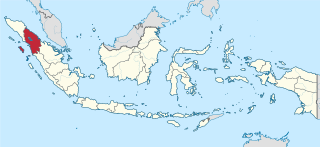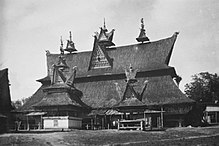
Medan is the capital and largest city of the Indonesian province of North Sumatra. The nearby Strait of Malacca, Port of Belawan, and Kualanamu International Airport make Medan a regional hub and multicultural metropolis, acting as a financial centre for Sumatra and a gateway to the western part of Indonesia. About 60% of the economy in North Sumatra is backed by trading, agriculture, and processing industries, including exports from its 4 million acres of palm oil plantations. The National Development Planning Agency listed Medan as one of the four main central cities in Indonesia, alongside Jakarta, Surabaya, and Makassar. In terms of population, it is the most populous city in Indonesia outside of the island of Java. Its population as of 2023 is approximately equal to the country of Moldova.

North Sumatra is a province of Indonesia located in the northern part of the island of Sumatra. Its capital and largest city is Medan. It is bordered by Aceh on the northwest and Riau and West Sumatra on the southeast, with two different coastlines located on the Indian Ocean and the Strait of Malacca, and a maritime border with Malaysia to the east. North Sumatra is Indonesia's fourth most populous province after West Java, East Java, and Central Java, and is also the most populous province outside of Java Island. North Sumatra is also the third-largest province in area on the island of Sumatra after South Sumatra and Riau provinces. It covers an area of 72,460.74 km2, which is approximately the same size as Sierra Leone or Scotland or Maine.

Batak is a collective term used to identify a number of closely related Austronesian ethnic groups predominantly found in North Sumatra, Indonesia, who speak Batak languages. The term is used to include the Karo, Pakpak, Simalungun, Toba, Angkola, and Mandailing, related ethnic groups with distinct languages and traditional customs (adat).

The Karo, or Karonese, are a people of the Tanah Karo and part of the Karo people from North Sumatra, Indonesia. The Karo lands consist of Karo Regency, plus neighboring areas in East Aceh Regency, Langkat Regency, Dairi Regency, Simalungun Regency, and Deli Serdang Regency. In addition, the cities of Binjai and Medan, both bordered by Deli Serdang Regency, contain significant Karo populations, particularly in the Padang Bulan area of Medan. The town of Sibolangit, Deli Serdang Regency in the foothills of the road from Medan to Berastagi is also a significant Karo town.
Kiras Bangun, also known as Garamata is a national hero of Indonesia.
The term Parmalim or malim describes the followers of the Malim religion, the modern form of the traditional Batak religion. People who are not familiar with the Batak language may erroneously assume Parmalim is the name of the religion rather than its practitioners.

Christianity is Indonesia's second-largest religion, after Islam. Indonesia also has the second-largest Christian population in Southeast Asia after the Philippines, the largest Protestant population in Southeast Asia, and the third-largest Christian population in Asia after the Philippines and China, followed by India. Indonesia also has the second-largest Christian population in the Muslim world, after Nigeria, followed by Egypt. Indonesia's 29.1 million Christians constituted 10.49% of the country's population in 2022, with 7.43% Protestant and 3.06% Catholic. Some provinces in Indonesia are majority Christian. In Indonesia, the word Kristen refers to Protestantism, while Catholicism is referred to as Katolik. In the 21st century the rate of growth and spread of Christianity has increased, especially among the Chinese minority.

Karo, referred to in Indonesia as Bahasa Karo, is an Austronesian language that is spoken by the Karo people of Indonesia. It is used by around 600,000 people in North Sumatra. It is mainly spoken in Karo Regency, southern parts of Deli Serdang Regency and northern parts of Dairi Regency, North Sumatra, Indonesia. It was historically written using the Batak alphabet which is descended from the Brahmi script of ancient India by way of the Pallava and Old Kawi scripts, but nowadays only a tiny number of Karo can write or understand the script, and instead the Latin script is used.
Sahid Group is an Indonesian conglomerate with the hotel industry as its core business, based in Jakarta. The group was founded in 1953 by Sukamdani Sahid Gitosardjono. Under the Sahid Hotels chain, the group operates 11 hotels across Indonesia, plus one hotel in Bukhara, Uzbekistan. It also manages three more hotels in partnership with other companies: the Ascott-branded Yello Hotel Beachwalk Bali, and the Marriott-branded Aloft Kuta Bali and Sheraton Bali Kuta.

Simalungun Regency is a regency in North Sumatra Province of Indonesia. Its seat was formerly at Pematangsiantar, but this city was under Law No.15 of 10 March 1986 was separated from the Regency and made into an independent city (kota), although it remains geographically surrounded by the regency, whose new administrative seat is at Raya, while the regency's two most populous districts are Bandar and Siantar. The regency now covers an area of 4,372.5 square kilometres, and at the 2010 census it had a population of 817,720; at the 2020 Census this had risen to 990,246, of whom 497,314 were males and 492,932 were females; the official estimate as at mid 2023 was 1,035,920 - comprising 521,262 males and 514,658 females.

The Gayo people are an ethnic group living in the highlands of Aceh Province, Sumatra, Indonesia. The Gayo tribe has a population of 336,856 and they live predominantly in the mountains. Most Gayo live in three regencies in Aceh namely Bener Meriah, Central Aceh, and Gayo Lues. Some of them live in several districts in other regencies, such as Serbejadi District, Simpang Jernih District, and Peunaron District in East Aceh Regency and Beutong District in Nagan Raya Regency. Other than that, the Gayo population also covers Southeast Aceh Regency and Aceh Tamiang Regency. Their homeland lies in the Barisan Mountains which has elevations of over 12,000 feet and extends more than one thousand miles. The Gayonese language has four dialects: Lut, Serbejadi-Lukup, Lut and Luwes. Their language does not have a writing system, but folk tales, stories and poetry are passed down in oral tradition. The traditional house of the Gayo is called Umah.

The Gereja Batak Karo Protestan or Karo Batak Protestant Church is the largest church among the largely Christian Karo people of North Sumatra, Indonesia. It was established formally in 1941.

Kerja Tahun, or Merdang Merdem, is a week-long annual festival held by the Karo people of North Sumatra to celebrate the rice-planting. 'Kerja' in this sense is a Karo word meaning 'party', and not the Indonesian 'kerja', which means work.

Tamil Indonesians are persons from Indian Tamil ancestry living in Indonesia. Majority of them live in Medan in North Sumatra while there are small community in other parts of the country such as Jakarta, Aceh, Riau and Riau Islands. It is estimated that there are around 25,000 PIOs/NRIs living in Indonesia of which the Indian expatriate community registered with the Embassy and Consulate in Medan numbers around 30,000.

Batak cuisine is the cuisine and cooking traditions of Batak ethnic groups, predominantly found in Northern Sumatra region, Indonesia. Batak cuisine is part of Indonesian cuisine, and compared to other Sumatran cuisine traditions, it is more indigenously preserved. One characteristic of Batak cuisine is its preference to andaliman as the main spice. That is why andaliman in Indonesia sometimes dubbed as "Batak pepper".
Mbaba Belo Selambar is a rite performed by both men and women one month before their wedding day in Karo Regency, Indonesia. It represents a series of rites of marriage and social life of the Karo.

Aru was a major Sumatran kingdom from the 13th to the 16th century. It was located on the eastern coast of North Sumatra, Indonesia. In its heyday the kingdom was a formidable maritime power, and was able to control the northern part of the Malacca strait.

Geriten, or "head-house", is the skull-house of the Karo people of North Sumatra, Indonesia. It is a pavilion-like structure with a distinctively shaped roof that acted as an ossuary where skulls of chiefs and important individuals are preserved after their deaths.
MV Sinar Bangun sank on 18 June 2018 in Lake Toba, North Sumatra, Indonesia, during its trip from Simanindo Harbour in Samosir Island to Tiga Ras Harbour in Simalungun Regency. The ferry was carrying 188 passengers and crew. After the sinking, authorities immediately deployed search and rescue personnel to the area. Twenty-one survivors were rescued, three bodies were found and 164 people were listed as missing and presumed dead.
Sada Sumatra Utara Football Club is an Indonesian football club based in Kabanjahe, Karo Regency, North Sumatra. They currently compete at Liga 2. In the 2021–22 Liga 3, Karo United came out as champions after defeating Putra Delta Sidoarjo, this is their first title in the club's history.














